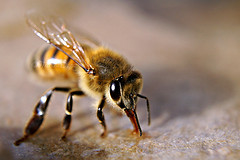Neonicotinoids are Neurotoxins to Humans Too
Neonicotinoid pesticides have been banned from the European Union and for good reason. Not only are they harming bee populations because they are neurotoxic to bees. They are also neurotoxins in humans.
European authority says they damage the brain
The European Food Safety Authority (EFSA) warns that the common pesticides categorized as neonicotinoids, which include acetamiprid and imidacloprid, will damage the human brain and nervous system.
The report, first released in 2013, suggested that permitted levels of exposure be reduced until more research is done to evaluate their neurotoxicity.
The report follows a new study from the Tokyo Metropolitan Institute of Medical Science. This studied the effects of acetamiprid and imidacloprid on developing nervous systems of rats. The researchers concluded:
“This study is the first to show that of acetamiprid, imidacloprid and nicotine exert similar excitatory effects on mammalian nAChRs at concentrations greater than 1 µM. Therefore, the neonicotinoids may adversely affect human health, especially the developing brain.”
The bottom line is that these neonicotinoids are neurotoxins not only to insects – including bees. They are neurotoxic to humans as well.
The EFSA stated in its release:
“The PPR Panel found that acetamiprid and imidacloprid may adversely affect the development of neurons and brain structures associated with functions such as learning and memory. It concluded that some current guidance levels for acceptable exposure to acetamiprid and imidacloprid may not be protective enough to safeguard against developmental neurotoxicity and should be reduced.”
The EFSA also proposed specific limits to the use of these pesticides:
“For acetamiprid – the current ADI (acceptable daily intake) and AOEL (acceptable operator exposure level) of 0.07 mg/kg bw/per day and the ARfD (acute reference dose) of 0.1 mg/kg bw should be lowered to 0.025 mg/kg bw (per day);
For imidacloprid, the current AOEL and ARfD of 0.08mg/kg/bw/day should be lowered to 0.06 mg/kg bw/per day. The current ADI for imidacloprid is considered to provide adequate protection against potential developmental neurotoxic effects.”
Other research has linked neonicotinoids to bee colony collapse disorder, which has occurred significantly in locations nearby the application of neonicotinoids.
More recently, the American Bird Conservancy reviewed 200 neonicotinoid studies, many of which had to be retrieved using the U.S. Freedom of Information Act. This concluded that treating seeds with neonicotinoids presented a hazard to numerous critters, including birds and sealife.
REFERENCES:
EFSA assesses potential link between two neonicotinoids and developmental neurotoxicity. European Food Safety Authority. Release, 17 Dec 2013.
Kimura-Kuroda J, Komuta Y, Kuroda Y, Hayashi M, Kawano H. Nicotine-like effects of the neonicotinoid insecticides acetamiprid and imidacloprid on cerebellar neurons from neonatal rats. PLoS One. 2012;7(2):e32432. doi: 10.1371/journal.pone.0032432.
Carrington D. US government sued over use of pesticides linked to bee harm.
















